Born January 3, 1947
Children: Sebastian Krajewski, Maksymilian Krajewski
In 1949 his family moved to Sopot, and he starting attending music school in 1954. In 1961, Mr. Krajewski he enrolled at the High School of Music in Gdansk.
1963
In 1963, he was a member of one of first Polish Rock and Roll groups Błękitni, and Złote Struny. As a singer and songwriter he performed at a famous Jazz club called Żak.
1965
January 3, 1965. Seweryn Krajewski became a member of the newly formed group, Czerwone Gitary. Their first official concert was on January 15 in Elbląg. On January 19th, the band started performing in the hall of the Grand Hotel Sopot, known as „winter Non-Stop”. Since he was underage he had to perform under a stage name, Robert Marczak.
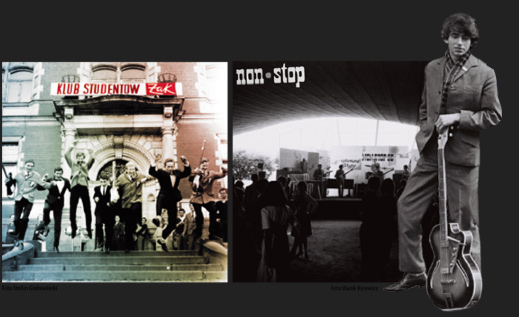
Robert Marczak
Aby uczniowie liceum mogli występować na scenie, stosowali przeróżne sposoby: ukrywali się, gitarzysta zastępował perkusistę, występowali pod pseudonimami. Seweryn Krajewski występował pod pseudonimem losowo wybranym z książki telefonicznej: Robert Marczak.
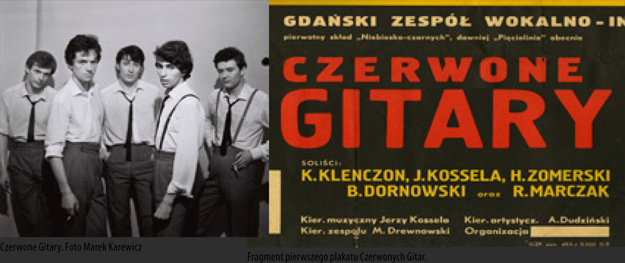
Pięciolinie
– formacja bigbitowa. Nazwę wymyślił Jerzy Kosela podczas pobytu w wojsku. W skład Pięciolinii wchodzili: Bernard Dornowski, Krzysztof Klenczon, Seweryn Krajewski, Tadeusz Mróz, Roman Mróz, Marek Szczepkowski oraz Henryk Zomerski.
1966 – 1970
Seweryn Krajewski, as a member of Czerwone Gitary, won numerous awards, including awards from the famous festival in Opole. In 1967 the Polish Jazz Federation awarded him the prize for debut as a composer (Song. „Stracić kogoś”). In 1968, again in Opole, he received the first prize for the song „Takie ładne oczy”.
Seweryn Krajewski became the „romantic” face of the band (eg. Song. „Anna Maria”), but he was also the author of dynamic rock and roll hits, including „Nie zadzieraj nosa” and „Tajemnica dziewczyny czyli śledztwo zakochanego”.
After the departure of Christopher Klenczon in 1970, Seweryn Krajewski became the main songwriter for Czerwone Gitary. Over the years, he composed such hits as „Ciągle pada” (lyrics: Christopher Dzikowski),”Płoną góry, płoną lasy”(lyrics: Janusz Kondratowicz), „Mam dobry dzień”(lyrics: Vladimir Patuszyński), „Słowo jedyne – ty” (lyrics: Christopher Dzikowski), „Port piratów” (lyrics: Agnieszka Osiecka), „Trzecia miłość – żagle”, Niebo z moich stron” and „Wschód słońca w stadninie koni”(lyrics: Krzysztof Dzikowski).
Mr. Krajewski also wrote the Polish pop megahits:”Nie spoczniemy” (lyrics: Agnieszka Osiecka), „Remedium” (lyrics: Magda Czapińska), and „Wsiąść do pociągu byle jakiego…”) performed by Maryla Rodowicz.
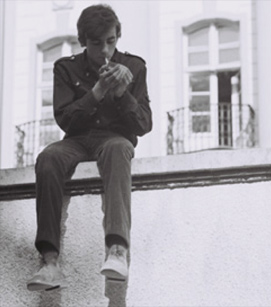
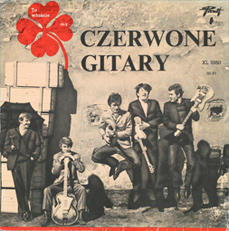
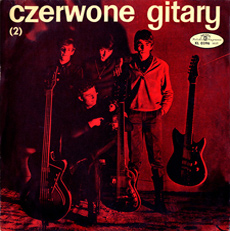
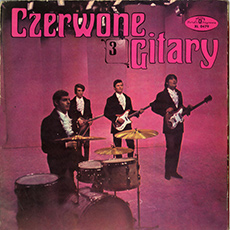
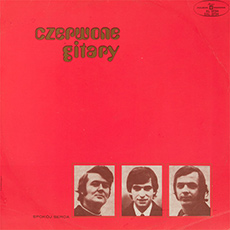
Since the mid-70s – Seweryn Krajewski began composing for film, TV, and theater. Many of his soundtracks became huge hits: „Uciekaj moje serce” (TV Theme Song for „Jan Serce”, (lyrics: Agnieszka Osiecka), „Baw mnie” (Film „Och, Karol” lyrics: Jacka Cygana), and „Czekasz na tę jedną chwilę”, (Film „Uprowadzenie Agaty”). Seweryn Krajewski also wrote the musical „Gwałtu, co się dzieje” by Aleksander Fredro (libretto: Krzysztof Dzikowski, adapted and directed by Lech Komarnicki) and music for the theater productions of „Motyle są wolne, Wesołych świąt”, „Najświętsza świętość” and „Wojna i pokój”. During this time, he also composed various film scores, a song for the film ” Hallo Szpicbródka” (dir. J. Rzeszewski , M. Jahoda ).
1981
„Strofki na gitare,” inspired by songs from TV shows „Z pamiętnika szalonej gospodyni”. These performances were based on letters from viewers.
1983
The album „Uciekaj moje serce” with music from the television series „Jan Serce” dir. R. Brewing, created at the request of Polish fans. Theme song lyrics written by Agnieszka Osiecka.
1984
Album, „Seweryn Krajewski”, with singles, „Ziemio błekitno-szara”, and „Między deszczami” was released on cassette by Polmark.
1986
The album, „Baw Mnie” released. Included the title song from the blockbuster film, „Och Karol” dir. R. Zaluski.
1989
The album, „Czesci Zamienne” (Strofki na gitare 2) released. Included songs from the TV show ” Z pamiętnika szalonej gospodyni”.
1993
Soundtrack for the film, „Uprowadzenie Agaty” dir. M.Piwowski, released on CD by Digiton.
1995
The album „Koniec ” released. Initially meant to be another Czerwone Gitary album, but due of creative differences, the album was released by Seweryn Krawjewski as a solo album.
1997
In 1997, Seweryn Krajewski parted with Czerwone Gitary and began his solo career. He began to compose music for texts of prominent songwriters: Magda Czapińska, Christopher Dzikowski, Jacek Cygan and Agnieszka Osiecka. Seweryn Krajewski wrote many songs for Maryla Rodowicz: „Chcę mieć syna ” (lyrics: Christopher Dzikowski), „Remedium” (lyrics: Magda Czapińska), „Wariatka tańczy ” (lyrics: Agnieszka Osiecka), „Dziewczyna ze snu ” (lyrics: Agnieszka Osiecka), Niech żyje bal” (lyrics: Agnieszka Osiecka), „Ludzkie gadanie” (lyrics: Agnieszka Osiecka), „Kolęda rozsianych po świecie” (lyrics: Jacek Cygan), „Czas upływa, lat przybywa” (lyrics: Andrzej Strzelecki), „Domowa czarownica” (lyrics: Jadwiga Has), „Jest cudnie” (lyrics: Magda Umer).
2000
In 2000, Seweryn Krajewski produced the album, „Lubie ten smutek”, based on works of famous Polish poets. Guest artists included Michal Urbaniak (violin), Bogumil Morka (tenor) and Slawomir Kulpowicz (piano).
2002
Pop aritst, Maryla Rodowicz’s album, „Życie ładna rzecz „, released. Included nine songs written by Seweryn Krajewski with lyrics by Mark Biszczanika.
2003
Seweryn Krajewski’s album „Jestem „, produced by Adam Abramek, released.
2008
Pop artist, Edyta Geppert’s album, „Nic nie muszę” released with all songs by Seweryn Krajewski.
2009
Live album of Seweryn Krajewski and Andrzej Piaseczny, „Na przekór nowym czasom „, released by Sony. It established as an album co-written with. Pop artist, Andrzej Piaseczny’s album, „Spis rzeczy ulubionych ” released with all songs by Seweryn Krajewski. Included the megahit „Chodź, przytul, przebacz „. Album, „Seweryn Krajewski Spiewa Wiersze Karola Wojtyly” released. Based on the poetry of Karol Wojtyla.
2010
Seweryn Krajewski received the Fryderyk award for Composer of the Year. Also awarded the Gold Medal „Gloria Artis” by the Minister of Culture and National Heritage.
2011
Seweryn Krajewski’s solo album, „Jak tam jest”, produced by K. Pszona, released by Sony. Lyrics by Andrzej Piaseczny. Guest artists: A.Teliczan, A.Piaseczny, and P.Cugowski. Album, „Filmowo”, released by Sony. Compilation of Seweryn Krajewski’s film scores. Orchestrated by Krzysztof Herdzin. Seweryn Krajewski received the Artist of the Year award and again received the Fryderyk award for Composer of the Year.
2012
Pop artist, Andrzej Piaseczny’s album, „To co dobre ” released. Included five songs written by Seweryn Krajewski. Joint album of Krajewski and Piaseczny, „Zimowe Piosenki” released. Production and arrangement: Mateusz Pospieszalski. Went Platinum in a week.
